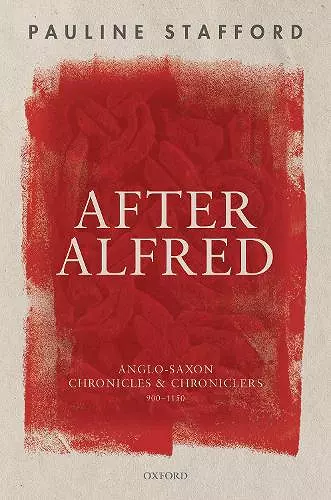After Alfred
Anglo-Saxon Chronicles and Chroniclers, 900-1150
Format:Hardback
Publisher:Oxford University Press
Published:5th Jun '20
Currently unavailable, and unfortunately no date known when it will be back
This hardback is available in another edition too:
- Paperback£28.99(9780192871367)

The vernacular Anglo-Saxon Chronicles cover the centuries which saw the making of England and its conquest by Scandinavians and Normans. After Alfred traces their development from their genesis at the court of King Alfred to the last surviving chronicle produced at the Fenland monastery of Peterborough. These texts have long been part of the English national story. Pauline Stafford considers the impact of this on their study and editing since the sixteenth century, addressing all surviving manuscript chronicles, identifying key lost ones, and reconsidering these annalistic texts in the light of wider European scholarship on medieval historiography. The study stresses the plural 'chronicles', whilst also identifying a tradition of writing vernacular history which links them. It argues that that tradition was an expression of the ideology of a southern elite engaged in the conquest and assimilation of old kingdoms north of the Thames, Trent, and Humber. Vernacular chronicling is seen, not as propaganda, but as engaged history-writing closely connected to the court, whose networks and personnel were central to the production and continuation of these chronicles. In particular, After Alfred connects many chronicles to bishops and especially to the Archbishops of York and Canterbury. The disappearance of the English-speaking elite after the Norman Conquest had profound impacts on these texts. It repositioned their authors in relation to the court and royal power, and ultimately resulted in the end of this tradition of vernacular chronicling.
Showing both depth of knowledge and fine analysis of the evidence, this book is unquestionably essential reading for anyone interested in chronicle-writing and its links with contemporary politics and ideologies. * SUSAN IRVINE, Early Medieval Europe *
a book with potential to shape discourse in the field of early medieval English history. * Matthew Firth, Journal of the Australian Early Medieval Association *
In After Alfred, Pauline Stafford's superb new history of the several vernacular chronicles (emphasis on the plural) spawned by Alfred's, she shows how these copies and continuations were embellished and edited in different times and places over the following 250 years. Stafford has acquired a depth of knowledge that allows her artfully to fathom the dark waters that crash about her material. Hers is a reminder -- of major significance -- of how these unutterably complex manuscripts should be read: with caution and context in equal measure. * Alex Burghart, Times Literary Supplement *
I expect I will be referencing this book regularly over the next years and hope that the volume succeeds in promoting further Chronicle scholarship. * Courtnay Konshuh, Speculum: A Journal of Medieval Studies *
ISBN: 9780198859642
Dimensions: 240mm x 164mm x 28mm
Weight: 758g
396 pages